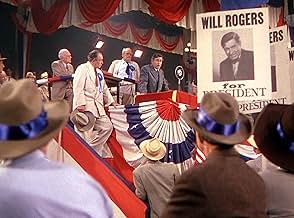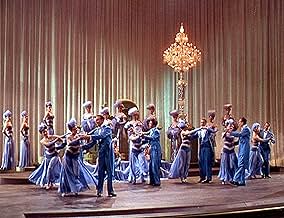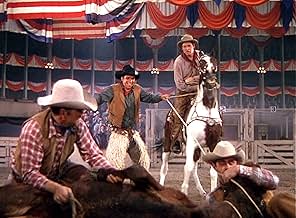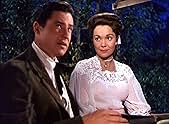The homespun humorist and social critic starts as a cowboy and goes on to vaudeville, movies, and radio.The homespun humorist and social critic starts as a cowboy and goes on to vaudeville, movies, and radio.The homespun humorist and social critic starts as a cowboy and goes on to vaudeville, movies, and radio.
Todd Karns
- 1st Mechanic
- (scenes deleted)
J. Carrol Naish
- Narrator
- (voice)
Dub Taylor
- Actor
- (scenes deleted)
Victor Adamson
- Townsman Greeting Will
- (uncredited)
Leon Alton
- Rodeo Spectator
- (uncredited)
Storyline
Did you know
- Trivia"Lux Radio Theater" broadcast a 60 minute radio adaptation of the movie on Janaury 12, 1953 with Will Rogers Jr. and Jane Wyman reprising their film roles.
- GoofsWhen Will Rogers leaves on his flight to Alaska in 1935 the plane that he and Wiley Post are flying is a Vultee BT-13 or -15 (depending on the engine used), an aircraft that didn't come into use until 1940. In the background as they are taking off are Boeing 377s (or C-97s), which debuted in the mid-1940s.
- Quotes
Will Rogers: Well it looks like the women are finally gonna get the vote. A lot of men say they shouldn't be trusted with it. Seems kind of silly to stop trustin' them now after eatin' their cookin' for 4000 years.
- ConnectionsEdited from Rhapsody in Blue (1945)
- SoundtracksHome on the Range
(uncredited)
Music by Daniel E. Kelley
Lyrics by Brewster M. Higley
Played at the beginning and during the opening credits
Sung at the Rogers party and used often in the score
Featured review
If The Story Of Will Rogers did not exactly stick close to the facts it certainly captured the spirit of the man who in his time was America's beloved entertainer. Will Rogers was in fact more than an entertainer, he was a shrewd and trenchant observer of the political and social scene. We could use a dose of his wisdom today.
Will Rogers, Jr., who as a dutiful son was the custodian of his father's legacy plays the role of his father and you'll swear it was the real Will. Of course one can see the real Will Rogers in any number of fine films he made for Fox. The film is based on his widow's memoirs and she is played by Jane Wyman so the Rogers family had a tight control on this one.
It was quite true that Rogers took a long time to find himself, he was something of a rebellious kid who did not take to school. Clem Rogers, his father is played by Carl Benton Reid and he was a power in the Cherokee Indian councils. All Will wanted to do was be a cowboy, but he had a knack for saying some real funny things off the cuff and eventually parlayed that into a vaudeville act and after that the Ziegfeld Follies and movies. And of course a newspaper column that a collection of will be a really shrewd observation of his times.
One thing that was a glaring error, Will Rogers was never put in nomination for president even as a favorite son. Governor William H. Murray of Oklahoma was in fact a presidential hopeful in 1932 and he would have been surprised at that turn of events.
Not to say that he wouldn't have made a good president. There is an underside to the Rogers legacy. The dark mirror image of Will Rogers who never met a man he didn't like is portrayed quite ably on the screen by Andy Griffith in A Face In The Crowd. Lonesome Rhodes would have said he never met a man he couldn't take.
One of the things that Rogers said that was quoted in this film was that this was the greatest country in the world, but taxes are the privilege you pay for living in it. I wish a lot more people would remember that today.
The Story Of Will Rogers and the films of Will Rogers provide an enduring legacy to a man who was a national treasure in his day and now.
Will Rogers, Jr., who as a dutiful son was the custodian of his father's legacy plays the role of his father and you'll swear it was the real Will. Of course one can see the real Will Rogers in any number of fine films he made for Fox. The film is based on his widow's memoirs and she is played by Jane Wyman so the Rogers family had a tight control on this one.
It was quite true that Rogers took a long time to find himself, he was something of a rebellious kid who did not take to school. Clem Rogers, his father is played by Carl Benton Reid and he was a power in the Cherokee Indian councils. All Will wanted to do was be a cowboy, but he had a knack for saying some real funny things off the cuff and eventually parlayed that into a vaudeville act and after that the Ziegfeld Follies and movies. And of course a newspaper column that a collection of will be a really shrewd observation of his times.
One thing that was a glaring error, Will Rogers was never put in nomination for president even as a favorite son. Governor William H. Murray of Oklahoma was in fact a presidential hopeful in 1932 and he would have been surprised at that turn of events.
Not to say that he wouldn't have made a good president. There is an underside to the Rogers legacy. The dark mirror image of Will Rogers who never met a man he didn't like is portrayed quite ably on the screen by Andy Griffith in A Face In The Crowd. Lonesome Rhodes would have said he never met a man he couldn't take.
One of the things that Rogers said that was quoted in this film was that this was the greatest country in the world, but taxes are the privilege you pay for living in it. I wish a lot more people would remember that today.
The Story Of Will Rogers and the films of Will Rogers provide an enduring legacy to a man who was a national treasure in his day and now.
- bkoganbing
- Nov 22, 2010
- Permalink
Details
- Runtime1 hour 49 minutes
- Aspect ratio
- 1.37 : 1
Contribute to this page
Suggest an edit or add missing content

Top Gap
By what name was The Story of Will Rogers (1952) officially released in Canada in English?
Answer


































